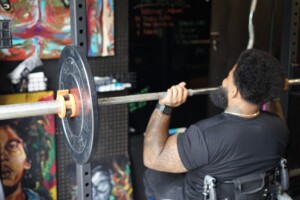SAFETY IN THE GYM

As we embrace the concept of fitness and well-being, it’s essential to ensure that everyone, regardless of age or ability, can participate safely in gym activities. The aging and disabled population, in particular, may have unique considerations and requirements to keep in mind for a safe and enjoyable workout experience. Let’s explore some crucial guidelines to promote safety in the gym for this wonderful community!
Consult with a Healthcare Professional: Before starting any exercise program, it’s essential to consult with a healthcare professional who can provide personalized advice based on your specific needs and medical history. They can help you determine the most suitable exercises and provide any necessary modifications.
Choose an Accessible Gym: When selecting a gym, prioritize facilities that are accessible and inclusive. Look for ramps, elevators, wide entrances, and accessible restrooms. Additionally, ensure the gym staff is trained to provide assistance and support to individuals with disabilities.
Warm-Up and Cool Down: Prioritize warm-up and cool-down routines to prepare your body for exercise and aid in recovery. Gentle stretching exercises and light cardio can help increase blood flow, flexibility, and range of motion, reducing the risk of injury.
Seek Professional Guidance: Consider working with a qualified personal trainer or exercise specialist who has experience working with the aging and disabled population. They can design a customized exercise program that meets your specific needs and goals while considering any limitations or conditions you may have.
Start Slowly and Progress Gradually: Begin your workout program at a comfortable pace, gradually increasing the intensity and duration as your fitness improves. Patience is key, as progress may take longer but is just as valuable.
Use Proper Equipment: Ensure that the gym equipment is safe and suitable for your needs. Adjust machines and benches to accommodate your body position and provide stability. If necessary, consider using adaptive equipment or assistive devices to enhance your workout experience.
Maintain Proper Form: Focus on maintaining proper form during exercises to minimize the risk of injury. Incorrect technique can strain muscles and joints. Seek guidance from a professional to learn the correct posture, body alignment, and movement patterns.
Listen to Your Body: Pay attention to your body’s signals and adjust your workout accordingly. If you experience pain, dizziness, or shortness of breath, it’s important to stop and seek medical attention if necessary. Rest when needed and don’t push beyond your limits.

Stay Hydrated: Drink water before, during, and after your workout sessions to stay properly hydrated. Dehydration can lead to fatigue, dizziness, and other complications. Keep a water bottle nearby and take regular sips throughout your workout.
Be Mindful of Surroundings: Pay attention to your surroundings and be considerate of others using the gym. Allow space for individuals with mobility aids, respect personal boundaries, and ask for assistance when needed. Building a supportive and inclusive community is essential for everyone’s well-being.
Remember, safety is paramount when it comes to exercise, especially for the aging and disabled population. By following these guidelines and seeking professional guidance, you can enjoy the benefits of physical activity while minimizing the risk of injuries. Embrace the journey towards a healthier and more fulfilling lifestyle!
Take the first step toward providing your loved one with the exceptional care they deserve. Contact us today at (281)892-1400 to schedule a personalized tour and learn more about our memory care and assisted living services. Our friendly team is ready to answer your questions and guide you through the process of finding the perfect caregiver at Kingwood Memory Care & Assisted Living. Together, we can create a supportive and nurturing environment where individuals with memory issues can thrive and lead fulfilling lives.
